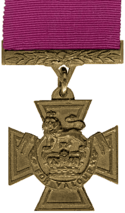James Marshall (VC) facts for kids
Quick facts for kids
James Neville Marshall
VC MC*
|
|
|---|---|
 |
|
| Born | 12 June 1887 Manchester, Lancashire |
| Died | 4 November 1918 (aged 31) Sambre–Oise Canal, France |
| Buried |
Ors Communal Cemetery
|
| Allegiance | |
| Service/ |
|
| Years of service | 1914–1918 |
| Rank | Acting Lieutenant colonel |
| Unit | Irish Guards |
| Commands held | 16th (Service) Battalion, Lancashire Fusiliers |
| Battles/wars | World War I † |
| Awards |
|
| Spouse(s) |
Edith Maud Taylor
(m. 1911) |
Lieutenant Colonel James Neville Marshall was a brave English soldier. He received the Victoria Cross, which is the highest award for showing amazing courage in battle. This special medal is given to soldiers from the United Kingdom and Commonwealth countries. James Marshall also earned the Military Cross and Bar for his bravery. He was born on June 12, 1887, and sadly died on November 4, 1918, during World War I.
Contents
Early Life and Joining the War
James Marshall was born in Manchester in 1887. When he was about seven years old, his family moved to Acocks Green, Birmingham. His father worked as a draper, selling fabrics. James went to King Edward's School. After school, he worked in offices at the Birmingham and Midland Institute and the University of Birmingham.
He later studied to become a vet and worked with animals in Harlow, Essex. When World War I began, James was in Argentina buying horses. But he soon returned home to join the army. He became a soldier in the famous Irish Guards. In 1911, James married Edith Maud Taylor. She never remarried after his death.
A Heroic Act in World War I
By 1918, James Marshall was 31 years old. He was an acting lieutenant colonel in the Irish Guards. He was also leading the 16th Battalion of the Lancashire Fusiliers. This was during the final days of World War I.
On November 4, 1918, his battalion was fighting near the Sambre–Oise Canal in France. They needed to cross a canal, but the bridge was badly damaged. This meant his troops could not get across.
Repairing the Bridge Under Fire
Lieutenant Colonel Marshall quickly organized groups of soldiers to fix the bridge. The first group of brave men were either killed or hurt by heavy enemy fire. But Colonel Marshall's amazing courage inspired more volunteers to step forward right away.
He stood on the bank of the canal, ignoring the dangerous gunfire. He encouraged his men and helped them with the repairs. He showed no fear for his own safety.
Leading the Attack
Once the bridge was fixed, Lieutenant Colonel Marshall tried to lead his men across it. He was at the very front, showing the way. Sadly, he was killed during this attack. His bravery allowed his soldiers to cross the canal. The famous poet Wilfred Owen was also killed in the same battle shortly after the bridge was crossed.
Awards and Legacy
For his incredible courage, James Marshall was awarded the Victoria Cross. He also received the Croix de Guerre from Belgium. He was also made a Chevalier of the Order of Leopold (Belgium), another Belgian honor.
Today, his Victoria Cross medal is on display in London, England. You can see it at The Guards Regimental Headquarters (Irish Guards RHQ).
James Marshall is remembered in several places. There are memorials for him in Harlow, where he once worked as a vet. He is honored at the Harlow War Memorial Institute. His name is also on memorials in the Old Harlow Baptists' Church, St. Mary's (Churchgate Street), and St Mary-at-Latton Churches.
James Marshall is also mentioned in a famous book called The Ghost Road by Pat Barker. In the book, he is called 'Colonel Marshall-of-the-Ten-Wounds'.
Images for kids
 | Calvin Brent |
 | Walter T. Bailey |
 | Martha Cassell Thompson |
 | Alberta Jeannette Cassell |


